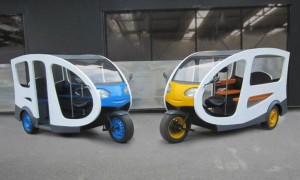
Taken from the article Philippines pumps money into electric tricycle plan, Gulf News, 13 March 2014:
The Philippines government has jump-started a programme to put thousands of electric tricycles on the country’s roads with the release of a half-billion peso counterpart fund.
In a statement, the Department of Budget and Management (DBM) said it had recently released P505.6 million (Dh41.7 million) to the Department of Energy to cover the government’s funding share in a project that will launch more electric-powered tricycles or “e-Trikes” on Metro Manila’s roads.
“Electronic tricycles are a viable, energy-efficient solution to a long-standing problem, as many of the tricycles still in operation are major sources of pollution that compromise air quality in the metro,” DBM Secretary Florencio Abad said.
The government’s counterpart fund will cover all expenses for the selection of project implementation consultants and the procurement of e-Trikes, the latter of which will entail paying the necessary taxes and conducting surveys with local government units and other stakeholders.
The Asian Development Bank (ADB) had earlier announced that it was allotting $300 million (Dh1.1 billion) for the programme, which was started in 2011. The Market Transformation Through the Introduction of Energy Efficient Electric Tricycle Project is a loan/grant agreement between the Philippine government and ADB/Clean Technology Fund (CTF).
Motor tricycles have long been recognised as the king of the Philippines’ side streets and minor thoroughfares. While Filipino commuters had no option but to bear with them, they have their drawbacks. They are noisy and smog emitting.
In comparison, e-Trikes run silently and cause less or no emissions.
“Many of us have already spotted a fair number of e-Tricycles running around Manila’s smaller side-streets. Now that the Aquino administration has released the government’s fund counterpart for the e-Trike project, we can expect to see more of these e-Trikes plying the routes taken by traditional tricycles, so that the electronic vehicles can take commuters to various drop-off points within their communities,” Abad said.
The P505.6-million release represents the energy department’s entire budget for the National Government’s fund share for the project this year. The initiative will be implemented until 2017 and will cost P21.7 billion (Dh1.7 billion) altogether, with the total government counterpart calculated at P4.26 billion (Dh351 million).
ADB Loan Information: http://www.adb.org/projects/documents/market-transformation-through-introduction-energy-efficient-electric-vehicles